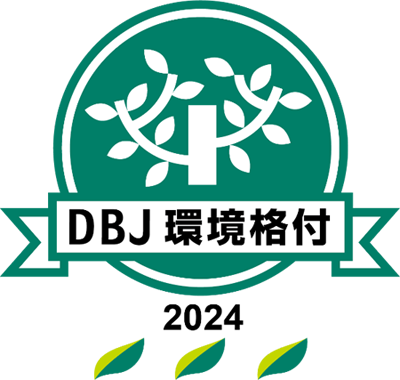SEKISUI CHEMICAL CO., LTD. (President: Keita Kato, hereinafter called "SEKISUI CHEMICAL") has attained the highest rank in the DBJ Environmentally Rated Loan Program being undertaken by Development Bank of Japan Inc. (hereinafter “DBJ”) in recognition that SEKISUI CHEMICAL’s environmentally conscious initiatives are especially advanced.

The DBJ Environmentally Rated Loan Program is the world’s first financing menu which uses a screening system (ranking system) developed by DBJ to score companies on the quality of their environmental management and select excellent companies.
This time, the following three points were highly rated.
(1) With a view to pioneering the positioning of the environment at the core of its management, SEKISUI CHEMICAL has been evolving its product evaluation system launched in 2006 through measures such as the expansion of standards while expanding sales of “Sustainability-contributing products” that contribute to the natural and social environment, such as high-performance interlayer films for automobiles and the “SPR method” for pipe rehabilitation. SEKISUI CHEMICAL is embodying sustainability management by presenting high-quality solutions that are aware of the correlation between environmental issues to society and linking these to its own competitive advantage.
(2) To maintain at least 100% of the “SEKISUI Environment Sustainability Index”, which represents the return on natural and social capital through its business activities, SEKISUI CHEMICAL is continuing its tireless challenge toward the realization of “Earth with Maintained Biodiversity,” which is the goal of the SEKISUI Environment Sustainability Vision 2050, by working to reduce the environmental impact with an awareness of the entire supply chain through production process innovation and raw material conversion, in addition to expanding the above-mentioned “Sustainability-contributing products.”
(3) SEKISUI CHEMICAL has adopted the vision statement “Innovation for the Earth.” With a system that promotes the enhancement and integration of each technology through the stratification of specialty positions that drive the R&D Committee and technology platforms, as well as human resource development such as employee training to improve contributions to solving social issues, SEKISUI CHEMICAL is strategically advancing into innovative areas such as perovskite solar cells that utilize sealing and coating technologies and bio-refinery that generate ethanol from waste and contribute to the realization of a resource-recycling society, promoting sustainable value creation through innovation at a high level.
In the Long-term Vision for 2030, “Vision 2030,” SEKISUI CHEMICAL Group has set the vision statement: “‘Innovation for the Earth’ – In order to realize sustainable society, we support the basis of LIFE and will continue to create “peace of mind for the future”. With “Business growth, reform and creation, centered on ESG Management,” it aims to expand its contribution to solving social issues through the expansion of existing businesses and creation of new businesses.
<Reference>SEKISUI CHEMICAL Group’s main environmental initiatives
https://www.sekisuichemical.com/sustainability_report/eco/
About SEKISUI CHEMICAL Group
Headquartered in Japan, SEKISUI CHEMICAL CO., LTD. (TSE: 4204) and its subsidiaries make up the SEKISUI CHEMICAL Group. 26,000 employees in over 156 companies throughout 20 countries and regions aim to contribute to improving the lives of the people of the world and the earth’s environment. Thanks to a history of innovation, dedication and a pioneering spirit, SEKISUI CHEMICAL now holds leading positions in its three diverse business divisions as well as top global market share in interlayer film, foam products, conductive particles and more.
SEKISUI CHEMICAL CO., LTD.
Corporate Communication Department
Email: kouhou@sekisui.com
Disclaimer
This press release may contain forward-looking statements. Such forward-looking statements are based on current expectations and beliefs and are subject to a number of factors and uncertainties that could cause actual results to differ materially from those expressed or implied by such statements due to changes in global economic, business, competitive market and regulatory factors.
